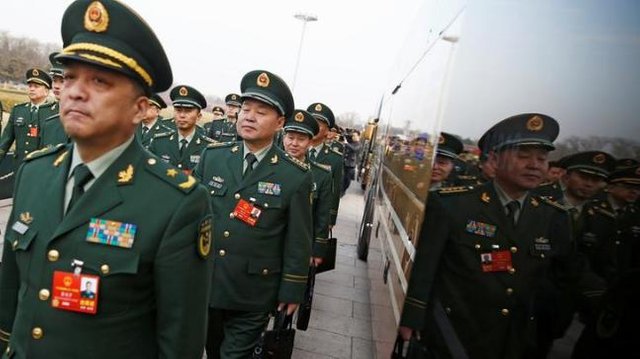China to increase 2018 defence budget by 8.1 per cent, says rise in spending no threat

China today skipped the customary announcement of the defence budget ahead of the annual Parliament meeting and justified the steady rise in its military spending, second highest in the world, saying it was in tune with its security needs and would not pose a threat to any country.
China also refuted criticism that its multi-billion-dollar Belt and Road Initiative (BRI) was a geo-strategic tool to spread its influence and said such a characterisation was a "misinterpretation".
Every year the spokesman of the National Peoples Congress (NPC) unveils the country's defence budget in terms of percentage.
However, this year Zhang Yesui, a former Vice Foreign Minister, who took over as the spokesman of the NPC did not reveal any percentage of increase but defended the steady rise in China's military expenditure, saying it was consistent with Chinas rise.
The defence spending may figure in Chinese Premier Li Keqiang's work report to be submitted to the NPC which kicks off its 15 day annual session tomorrow.
Zhang defended the steady increase in China's defence budget saying: "The country's national defence we believe it needs to develop in step with its economy and serve country's security and development interests."
"Countries around the world adjust their defence budget according to their defence needs and their level of economic development. This is a common practice," he said.
China had last year increased its defence budget to USD 150.5 billion -- three times higher than India's latest defence budget of about USD 52.5 billion.
The defence budget of the US which is the highest in the world amounted to USD 602.8 billion.
Though China announced its military spending at about USD 150.5 billion, observers say it is considerably higher, considering it is now building two more aircraft carriers in addition to the one already in service as well as addition of new jet fighters, including stealth fighter J-20.
Chinese Navy also expanded its global reach with flotilla ships sailing through the far-off oceans to expand China's influence.
Zhang described the steady increase of China's defence budget as "modest".
"In recent years, China has increased the inputs of defence by a modest margin. A large part is to make up for past short falls to upgrade the equipment, improve the welfare of the men and women and living conditions at the grassroots levels," he said.
"If we take a look at the share of defence budget in China's GDP or national fiscal spending and also per-capita term, China's defence input is still lower than many countries.
"China is committed to a path of peaceful development and it pursues a defence policy which is defensive in nature. China's development will not pose a threat to other countries," he said.
Zhang also denied that the multi-billion dollar Belt and Road Initiative (BRI) was China's geo-strategic tool, saying such a characterisation was a misinterpretation.
"To say that the Belt and Road Initiative is a geo-strategic tool, in my view, this is a misinterpretation of the initiative," Zhang said.
India has opposed the China-Pakistan Economic Corridor connecting China's Xinjiang with Gwadar as it passes through the Pakistan-occupied Kashmir.
"Five years ago, President Xi Jinping put forward the (BRI). Over the past five years, thanks to the joint efforts from all parties, this initiative is being turned into actions from a concept, and it is being translated into reality from a vision," he said.
Infrastructure connectivity building has yielded early harvests, policy communication is going deeper, cooperation mechanisms are being strengthened and collaboration is unfolding across the board, Zhang said.
All these concrete results fully demonstrate that the initiative has really responded to the trend for win-win cooperation and the shared aspiration for common development, he said.
"It is natural for the initiative to face challenges in its early stage," he said, adding that China welcomes all parties to work together to pursue shared benefits through dialogue and collaboration.